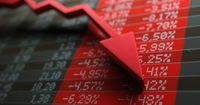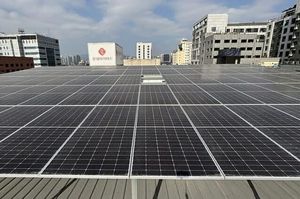US equity markets experienced a sharp downturn on Thursday, April 3, 2025, following President Donald Trump’s announcement of significant tariffs on all exports to the United States. The tariffs, which range from 10% to 49%, were designed to address large trade imbalances and sent shockwaves through the financial world, triggering fears of a potential recession. The Nasdaq Composite Index fell by 5.97%, while the S&P 500 and the Dow Jones Industrial Average dropped 4.84% and 3.98%, respectively. This marked the worst trading session for these indices since the COVID-19 crash in 2020.
Market analysts have pointed to the tariffs as a catalyst for increased volatility and uncertainty in global markets. Nick Timiraos, Chief Economic Correspondent for The Wall Street Journal, noted that Trump's economic advisers have previously suggested that tariffs need not raise consumer prices as long as the dollar appreciates. However, the current situation indicates the opposite, as the dollar has depreciated, contributing to investor anxiety.
Among the most affected companies was Apple Inc. (AAPL), which saw its stock plunge by 9.25%. Analysts estimate that a 10% tariff could reduce Apple’s net income by approximately 3.5% to 4%, with a 9% impact on its gross margin if tariffs on China remain in place. This is particularly concerning given that Apple relies on China for over 90% of its manufacturing, making it highly vulnerable to these new tariffs. As reported by CN Wire, "The tariffs hit Apple’s major manufacturing hubs in China, Taiwan, India, and Vietnam, potentially affecting nearly every product Apple sells, from iPhones to accessories."
The fallout from the tariff announcements was felt globally. On April 4, Asian markets opened to significant losses, reflecting the previous day’s sell-off in the US. Notably, the Nikkei 225 index in Japan extended its losses, sliding 2.64%, while Australia’s ASX 200 dropped 1.94%. The Hang Seng Index and Mainland China markets were closed for trading due to the Ching Ming Festival, but analysts expect market reactions to surface when trading resumes on Monday, April 7.
In addition to the immediate market reactions, Fitch Ratings downgraded China’s credit rating from A+ to A, maintaining a stable outlook but forecasting GDP growth to slow to 4.4% in 2025, down from 5.0% in 2024. The escalating trade tensions have resulted in China facing accumulated tariffs of 54%, raising concerns about potential retaliation. Jeroen Blokland, founder of Blokland Smart Multi-Asset Fund, remarked, "The key thing to watch now is the Chinese Yuan. If China decides to retaliate by sharply weakening the Yuan, this correction will get significantly deeper."
As fears of a recession mount, analysts are closely monitoring the situation. Shane Oliver, Chief Economist at AMP, estimates a 40% chance of a US recession, noting that global growth could slow to 2% from a previous estimate of 3%. Similar sentiments were echoed by HSBC analysts, who also suggested a 40% likelihood of recession by year-end. Betting markets like Polymarket saw a spike in recession odds, rising to 49% as of April 3, compared to just 23% in early March.
Despite the negative outlook, some analysts believe that the Australian share market may weather the storm better than others. Australia currently faces a baseline 10% tariff, which is considered a modest hit given that US exports account for only 1% of Australia’s GDP and 5% of total exports. However, the broader implications of reduced demand from major trade partners, particularly in Asia, could pose significant risks.
Historical data suggests that Australia has largely dodged recessions thanks to robust commodity exports and fiscal stimulus. The only technical recession in nearly three decades occurred during the pandemic in 2020. The S&P/ASX 200 has shown resilience in the face of global downturns, but significant uncertainties remain. As Oliver points out, "The emerging structural shifts to global rules of engagement, trade, and rising protectionism for a medium-sized economy like ours isn’t too positive."
Market sentiment is currently dominated by fears of further retaliatory tariffs and the potential resurgence of inflation. The volatility in the markets has left investors grappling with uncertainty, with many adopting a cautious approach. Analysts warn that while the ASX 200 has a track record of resilience, it is not immune to global shocks. If the economic damage remains limited, the market may only experience a modest decline. However, if a full-blown recession looms, the outlook could worsen.
In conclusion, the recent tariff announcements by President Trump have sent ripples through both US and global markets, igniting fears of a recession and prompting swift reactions from investors. As the situation unfolds, all eyes will be on how trade partners respond and whether further economic stimulus measures will emerge to mitigate the impact of these tariffs.





